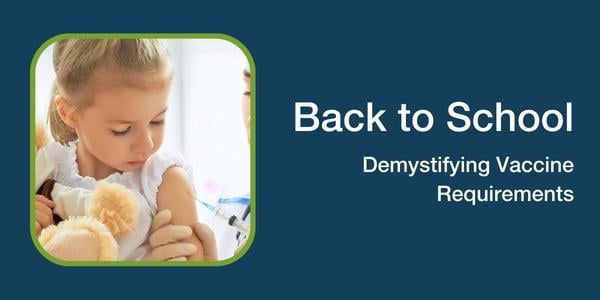As schools around the country come back into session, ensuring students are up to date on immunizations is key to preventing widespread illness.
All states require children to be vaccinated against certain communicable diseases as a condition for school attendance. Usually, these requirements extend to public and private educational facilities; this also includes most homeschool settings where individuals from multiple households are in attendance.
There is some national parity surrounding vaccine requirements for school attendance. Every state requires students receive the following vaccines as a condition for enrollment:
- DTaP (Diphtheria, Tetanus, Pertussis)
- MMR (Measles, Mumps, Rubella)
- Polio
- Varicella
Additional vaccines may be required on a state-by-state basis. Students are required to be vaccinated against Hepatitis-B in 44 states, against meningitis in 30 states, and against Hepatitis-A in 16 states.
In addition, students must provide proof of vaccination to the state to meet the vaccination requirement. Like vaccination requirements themselves, proof-of-vaccination documentation varies from state to state.
Variances and Exemptions
The CDC has compiled a comprehensive document that outlines state-by-state exemption availability and requirements for school vaccinations.
There are three basic types of exemptions from school vaccination requirements: medical, religious, or philosophical reasons.
The legality of these exemptions varies from state to state and vaccine to vaccine. The length an exemption is valid also differs across the country and usually must be renewed every school year.
All 50 states recognize a medical exemption as a valid reason to forego school vaccinations. These often require notarized documentation from a medical provider to be honored.
Most states recognize religious or philosophical exemptions as well. These are considered non-medical exemptions, and while valid, there are different application requirements, eligibility standards, and recognition cases for these exemptions.
Non-medical exemptions may also require parental education and notarization to be valid.
In several states these exemptions may be superseded in the event of a disease outbreak. In these situations, students may be excluded from school until they are vaccinated or until the outbreak subsides.
Combatting Vaccine Hesitancy
Vaccine hesitancy has always been a challenge in early childhood vaccination efforts. During, and as a result of, the COVID-19 pandemic, confidence in the importance of childhood vaccines has declined.
The CDC has developed resources to assist medical professionals with patient conversations related to childhood vaccinations. The CDC also continues to stress vaccines are the best defense against the prevention of disease.
Other Blogs You Might Be Interested In...
- Vaccine Preparedness: Are You Ready for Earlier School Start Dates?
- VFC By the Numbers: 30 Years of Protecting Americans Every Day
- 2023 Vaccine Schedule Updates for Adults, Children
- Bivalent Vaccines Provide Protection in ‘Tripledemic’
Helmer Scientific is dedicated to supporting medical professionals responsible for vaccine administration. Helmer's GX Solutions vaccine refrigerators and freezers are certified to the NSF/ANSI 456 Vaccine Storage Standard.
NSF/ANSI 456 is the first global standard that certifies cold storage equipment used to store vaccines can maintain performance requirements in real-world scenarios.
Storing vaccines at proper temperatures ensures they remain safe and effective for administration to patients. It also reduces vaccine waste due to improper temperature exposure.





